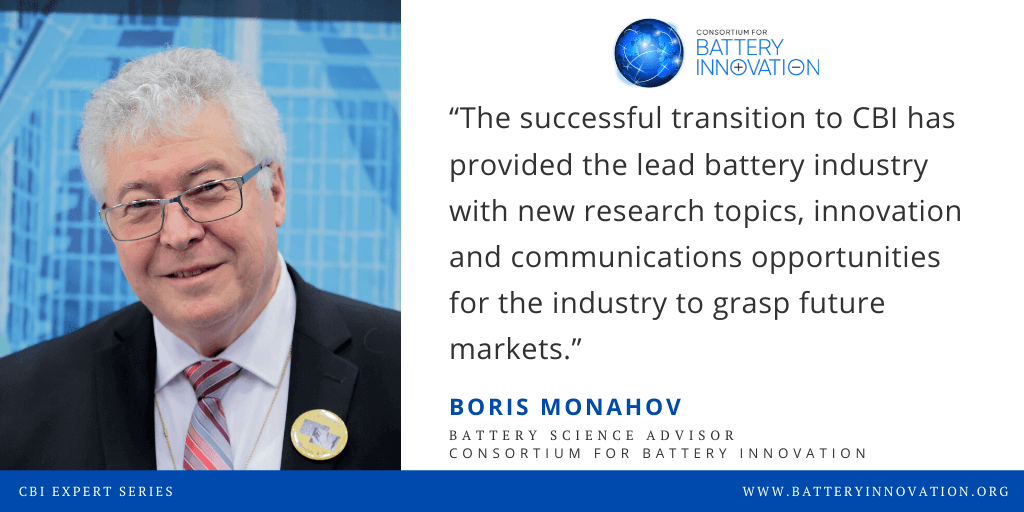
Expert Panel Blog Series: CBI invites Dr Boris Monahov, Battery Science Advisor, who was the previous program manager of ALABC, to share his thoughts on the importance of fundamental research
2019 saw the launch of the Consortium for Battery Innovation (CBI), following three decades of ALABC, a research organization dedicated to the development of lead battery technology. CBI continues this important work with a renewed focus on driving innovation in lead batteries, paired with a strong communications and marketing program. It continues and brings to a higher level the unique research partnership of lead metal mining and recycling companies, major battery manufacturers and industry suppliers aiming for rapid battery performance enhancements and maintaining the strong position of lead in the fast-growing battery market. Other battery chemistries still do not have such a global and well supported science and technology knowledge generator.
The successful transition from the 26-year-old ALABC to a new type of association has provided the lead battery industry with new research topics, innovation and communications programs to grasp the new market opportunities facing the industry. Building on the success of previous technical programs and summarizing the research needs and expectations of the membership in new market conditions, CBI launched a new technical roadmap. The goals and targets set out in the roadmap were developed in close partnership with all levels of management, research, production and marketing from CBI’s global membership. It is with pride and satisfaction that I observe how this exciting global research initiative is developing through the years.
For me, the focal points in the roadmap are two: supporting performance enhancements for automotive and energy storage applications – the major market opportunities for lead batteries today and in the coming decade. Ambitious benchmarks were set for charge acceptance, cyclability, water loss and corrosion resistance in enhanced flooded automotive batteries, as well as for cycle life in energy storage batteries.
Based on these target values the new technical research program for 2019-2021 was developed and launched. For the first time in lead battery research, new research methods and techniques developed in recent years for other applications have been combined with the latest battery science theory in order to provide next-generation results.
I am particularly excited about the in-situ TEM observation of crystal electrochemical nucleation and electro crystallization; neutron diffraction of active mass samples; getting control over the synergetic effect of carbon additives and lignosulfonates on crystal growth in negative plates for achieving pre-selected DCA and water loss goals; learning how to control overcharge in order to extend cycle life.
These fundamental science studies are being supported by important initiatives and tools for the CBI membership and end-users of lead batteries. Some key that stand out to me have been the development of an energy storage online tool, an overview of battery related standards from across the globe, initiatives for better communications support and finding new opportunities for lead battery energy storage.

Alongside members from the lead battery industry, CBI extends the partnerships with universities and academic research centers. As a result, a new group of bright researchers have been involved in the research projects and joined the lead industry community, many of them young people – something our industry vitally needs for developing new and advanced batteries: carbon-enhanced, bipolar, using new materials and technologies. Preparing a new wave of lead battery engineers and scientists is an important task for the future of lead batteries. The collaboration between industry, research and academia can be seen in the proposal submitted by CBI for Horizon 2020 funding, aiming to develop a new bipolar battery design with parameters demonstrating improved performance compared to existing lead batteries.
For the first time in its long history, the lead battery industry has been involved in basic material science research in partnerships with both governments and academic institutions across the world. This includes work with the Argonne National Laboratory (ANL) in the US, the European synchrotron ESRF and Imperial College London in the UK. CBI also strengthens the research collaboration with CEA in France, the Fraunhofer Institute in Germany and many more.
Since launching in 2018, the ANL project has been actively supported by CBI, which is disclosing new, unknown and unexpected aspects of the electrochemistry of lead batteries.
CBI continues its close partnership with the Research Center of Ford in Germany, and together with Dr Karden, several researchers from CBI member companies combined efforts for disclosing the secrets of DSCA, effect of carbon, DCA and water loss. I believe these studies are extremely important and are of critical importance for the future of lead batteries in the automotive sector. The workshops held each year are attended by global car manufacturers, battery experts and researchers, with the results obtained already used by the industry.
The new program, bringing together fundamental scientific research and communicating it to CBI’s stakeholders is central to CBI’s work and is supported by the membership. This is illustrated by the rapidly growing number of members: already well over 100 from countries in all continents! I wish the talented young management of CBI to continue in their great success.
